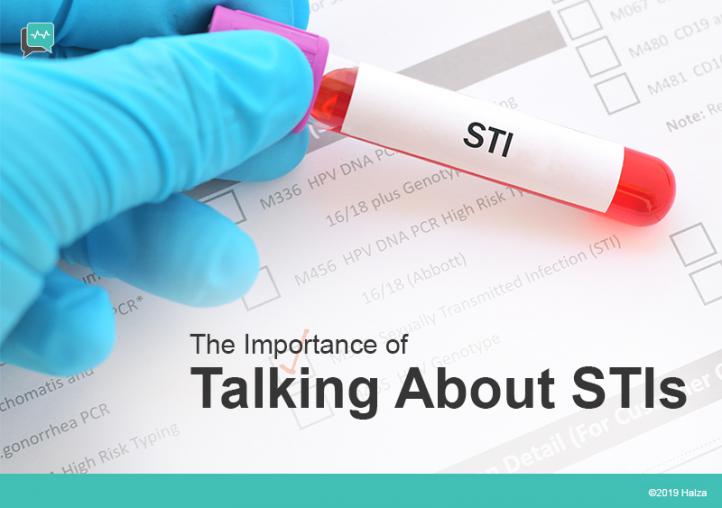Breaking the Stigma: Why Talk About STIs?

Four common STIs – gonorrhea, syphilis, trichomoniasis, and chlamydia – are all preventable
and are usually curable. Yet every single day one million people contract one of those four diseases.
People don’t talk about STIs with their sexual partners, and as a result:
- People are having unprotected sex without knowing if they or their partner has a sexually transmittable disease, and
- People carrying sexually transmittable diseases are having unprotected sex.
Every day, one million new people are suddenly prone to developing the following symptoms:
- Unusual vaginal or penile discharge
- Genital itching
- Pain with intercourse
- Lower abdominal pain
- Burning pain while urinating
- Anal discharge,
- Genital ulcer
- Testicular pain
- Genital rash
- Hair loss
- Infertility
- A higher risk of contracting HIV
Every day, one million new people can transmit an STI to their sexual partner.

And as a result of one of those four STIs, every day:
- Babies are born who will never take a breath without effort, be able to see their mother’s face, or live independently as adults.
- Babies are stillborn.
- Babies are delivered in good health, only to lose their vision, develop permanent brain damage, or die days or weeks later.
- Desperately hoped-for babies will never even be conceived.
These tragedies usually happen when people simply assume that neither they nor their partner has an STI.
Most of us are clean, choosy about our sex partners, and we hope or even believe that we are practicing ‘safe enough’ sex. We are exactly like the parents of babies affected by an STI, and exactly like other people suffering from genital discharge, itching, or ulcers –before they contracted an STI.
There are many reasons not to talk to your partner about STIs. None of them are valid.
Here’s what you need to know about STIs
1. You can have an STI, and you can give an STI to someone else, without having a single symptom of an STI. STIs are sneaky. They can live inside you for a long time without causing any symptoms.
During that time you can pass the infection to someone else who also might not have symptoms. At some point, both of you will probably develop symptoms, but not until it’s been passed on to someone else.
2. Even if you trust your partner, you can’t trust everyone they have ever slept with, everyone those people have ever slept with, and everyone those people have ever slept with.
Using an online calculator with a formula developed specifically for this purpose, you would find that a person who has had 5 sex partners, each of whom has had 5 sex partners, and so on through 6 levels of exposure has indirectly exposed themselves to STIs from 19, 350 people.
Break the chain that leads to tragedy. Talk to your partner about STIs.

Here’s how to have The Conversation
1. Think about the outcome that you want. Things you might want to know include:
- If your partner was tested recently for STIs, and what the results were.
- If your partner is willing to use condoms
- If your partner is willing to get tested with you
- If your partner is having sex with anyone else or would consider having sex with anyone else
- If your partner has ever had an STI and if he or she went for follow up testing after the treatment

2. Think about why you might be uncomfortable bringing up the subject.
Is it simply because it feels awkward or you have never done it before? Or is it because you are uncomfortable with your partner (and if that is the case, should you be having sex with them)? Are you afraid that you won’t like the answer and won’t know how to respond?
3. Learn the facts about STIs.
Consider which of the many reasons for getting tested might best resonate with your partner. If ‘concern for your well-being’ is not high on the list of reasons, you might decide to reconsider the relationship.
4. Think about when and where to have the conversation.
Ideally, it will be somewhere quiet, distraction-free, and fully clothed.
5. Plan what to say and practice out loud to yourself or with a friend.
Once you have already said words out loud, they usually feel like less of a big deal.
6. The first sentence is probably the hardest.
Some suggestions are:
- I know someone who had an STI, and until she was treated, she was miserable. I don’t want that to happen to either of us, so I’m going to get tested. If you haven’t been recently tested, would you come with me?
- I appreciate that we trust each other, and that we each have trusted other people we’ve been with. But even if we trust all the people those people have been with, or the people before them, any one of them could have passed an on STI without knowing it, and therefore one or both of us could have an STI without knowing it. Will you go with me to get tested?
- I want to be completely honest and tell you that I was recently tested for STIs and it turned out that I had chlamydia (or whatever you had). I was treated, and it’s completely gone, but I was completely shocked that I got it. I didn’t think there was any way that I had an STI until I developed symptoms, and I really don’t want that to happen again. Would you go to get tested?
7. Anticipate different reactions your partner might have, and how you will respond.
8. Listen to your partner’s response, even if it sounds ridiculous.
One or both of you might have a misconception about your expectations, about the danger of STIs, or about the risks of testing. Your partner’s first thought might be that you don’t trust them, or that you think that they are cheating on you, or something else you didn’t anticipate. Be willing to hear them out.
9. Prepare a list of STI testing centers and give your partner a copy.
This makes it as easy as possible for your partner. It also shows that you are serious about getting tested.

I already have an STI. How do I tell my partner?
Telling a partner that you have an STI is rarely easy. Your partner might be understanding and supportive, but you should be prepared for a negative reaction. Be prepared for the topic to raise questions about fidelity – either yours or your partners.
Remember that being diagnosed with an STI is not proof that one partner cheated on the other. Depending on the type of STI, symptoms can take a very long time to develop, and it is entirely possible that you or your partner contracted the STI long before you even met each other.
First, look at some of the suggestions in the section above. In particular:
- Think about when and where to have the conversation
- Plan what to say and practice out loud
- Anticipate the different reactions your partner might have
- Listen to your partner’s response
Know the facts about your STI.
Things your partner might want to know might include:
- how the STI is transmitted
- if you have already possibly transmitted it to your partner
- when it will be safe for you to have sexual relations
- what are the consequences of having sex with you
- if you or your partner now have a higher risk of contracting HIV
- how your STI is treated
- where your partner can get tested

Have the discussion somewhere public. People tend to modulate their emotions better in public places. If you are at all reasonably concerned that your disclosure will provoke an aggressive reaction, you may have just realized that you should not under any circumstances be in this relationship.
- If the cost of testing or treatment is a problem for your partner, try to find a low-cost facility, or if you are able, offer to contribute part of the cost.
- Stick to the facts in any discussion. Interjecting emotion or blame is not productive.
- Remember that if you decide not to tell your partner, not only do you risk passing the infection on, but you risk being re-infected yourself.
Talking to your partner about STIs should be a normal part of any anticipated sexual activity. Initiating the conversation becomes easier each time you do it, and it is much, much easier than dealing with the potentially tragic consequences of acquiring an STI. Simply by having a conversation you have the power to protect yourself, your partner, and your children, and you can break the chain of transmission of a devastating STI to countless other people.
Just by talking to your partner about STIs.
How Halza helps
Having easy access to a complete overview of your medical history simplifies your health journey. Store, track & share your medical records on the Halza app, also available in 26 languages. Upload your test results after attending regular STI screenings and set Health Reminders for follow-up appointments or check-ups. You can also set Medicine reminders to make sure you never miss a dose of medication on your road to recovery.
Download now!